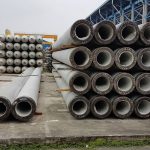In the era of global digitalization, Indonesia’s telecommunications industry continues to grow rapidly. Many companies now export critical equipment such as base transceiver stations (BTS) antennas, servers, and transmission devices to destinations such as the United Arab Emirates, India, and Australia. These shipments involve a complex logistics chain, from storage and loading to shipping and unloading at the destination port.
However, behind these significant opportunities, there are risks that cannot be ignored. One recent case rocked Indonesia’s technology exports: telecommunications equipment worth Rp 25 billion was severely damaged during loading and unloading at the destination port. The damage was caused by high humidity inside the container, which went undetected during shipping. The shipping company was forced to bear the full cost of the loss because the insurance claim was rejected due to inconsistencies in the policy.
This incident serves as a reminder that shipping high-value goods such as telecommunications equipment requires not only strict logistics management but also strong financial protection. Because at every stage of the cargo journey, whether by sea or land, risks can arise unexpectedly, ranging from extreme weather, ship vibrations, human error, to improper handling. A single, small gap in a shipping contract can have devastating consequences for a company’s finances. This article will…dissectcorrosion and moisture risks, as well as comprehensive freight insurance solutions. Before risks like these halt operations and cause significant losses, ensure your coverage is comprehensive.ContactL&G Insurance Brokernow in08118507773for a free consultation and recommendations for the best protection for your business.
Case Chronology: Exported Goods Damaged in Transit
The shipment began from Tanjung Priok Port to Dubai, traveling by sea with a travel time of approximately three weeks. The goods were packed in a sealed, refrigerated container to maintain a stable temperature. However, during the journey, a small leak in the cooling system occurred, causing condensation inside the container.
The undetected high humidity caused internal corrosion and circuit damage to several telecommunications devices. As a result, upon arrival at the destination port, the functional value of the goods decreased drastically, with some even rendered unusable. The logistics team immediately filed a claim with the insurance company. Unfortunately, the claim was rejected on the grounds that damage due to humidity was not covered by the standard policy (Institute Cargo Clause B). However, the losses covered reached Rp 25 billion.
This is where a cargo insurance broker like L&G Insurance Broker plays a crucial role. An experienced broker will ensure your shipping policy covers often-overlooked risks, such as moisture damage, improper handling, and loading/unloading risks. Standard policies typically only cover major risks like sinking or collision, not the detailed risks inherent in sensitive electronics and telecommunications.
Loss Value and Impact on Business Reputation
The exporter’s losses extend beyond the Rp 25 billion value of the damaged goods. The export contract stipulates a penalty if the goods do not arrive as specified. The shipping company is forced to compensate the buyer for the Rp 25 billion loss, as well as losing business confidence for future projects.
In addition, damaged electronics trigger a domino effect:
- The suspension of network installation in the destination country resulted in project delays and fines.
- Loss of new business opportunities due to the company’s reputation being perceived as incapable of managing logistics risks.
- Additional costs for re-shipping replacement goods (freight and handling).
- Surveyor and Loss Adjuster fees that the company must bear because the claim was rejected.
This case shows that losses due to delivery failure are not only physical, but alsoreputasionaland financial. Therefore, cargo insurance is an important component of an export risk management strategy.
Often Missed Risk Exclusions
Claim denials often occur because the shipper doesn’t fully understand the policy’s terms. In the case above, the company only purchased a standard policy (Institute Cargo Clause B), which excludes damage caused by moisture, vibration, or human error during loading.
Some common reasons claims are denied include:
- Improper packing – packaging does not meet the standards of electronic goods that are sensitive to shocks.
- Condensation damage – damage due to moisture inside the container (the risk that occurs in this case).
- Handling error – damage due to logistics operator error during loading and unloading (another common cause at ports).
- Policy without additional endorsement – does not cover loading and unloading and land transit risks (warehouse to warehouse coverage).
If a company uses a professional insurance broker from the outset, this risk can be avoided. Brokers like L&G Insurance Broker help ensure every aspect of the shipment—from the type of goods and mode of transportation to the route and climate—is thoroughly reviewed to ensure the policy covers all potential risks inherent in telecommunications equipment.
The Role of Insurance Brokers in Protecting High-Value Export Goods
Many exporters still believe they can purchase freight insurance directly without the assistance of a third party. However, in practice, without the guidance of an insurance broker, many risks are overlooked because standard policies are inadequate for sensitive cargo.
Insurance brokers play a role in:
- Analyze shipping risks based on the characteristics of the goods and distribution routes (for example, climate analysis on the route to Dubai).
- Drafting policy wording that suits the exporter’s needs, including additional clauses such as temperature clauses and handling clauses.
- Negotiate the best premium with the insurance company (brokers have better bargaining power).
- Accompanying the claims process so that exporters are not disadvantaged and claims are processed quickly.
For example, L&G Insurance Broker has helped numerous electronics companies ensure that every export shipment is protected by all-risk cargo insurance with extended moisture protection. Every high-value shipment should be treated like a major investment.
The Right Type of Policy for Electronics and Telecommunications
For shipping high-value electronics, the following types of policies are recommended and should be prepared by insurance brokers:
- Institute Cargo Clause (A): Provides all risk (highest) coverage except those explicitly excluded.
- Temperature and Humidity Clause: A crucial clause that protects against damage due to changes in temperature and humidity (very important for telecommunications equipment and servers).
- Handling Clause (Including Loading & Unloading): Covers risks during loading and unloading and land transit, eliminating risk gaps at the port.
- Delay in Start-Up (DSU) Extension: Covers loss of revenue (Business Interruption) resulting from project delays due to damaged or failed delivery of goods.
- Professional Indemnity for Logistics Vendors: Additional protection for vendors who perform packing and logistics, guaranteeing their professional liability.
Brokers like L&G Insurance Broker will help tailor this combination of clauses to the characteristics of the goods being shipped. This way, your cargo insurance will function optimally.
Pre-Shipping Risk Mitigation Strategy
In addition to insurance protection, there are important steps to minimize risks during shipping:
- Use moisture-proof and shock-resistant packaging (humidity absorbent and international standard crating).
- Conduct a pre-shipment survey to ensure the condition of the goods and packaging meets standards.
- Install temperature and humidity sensors in containers (IoT monitoring).
- Audit logistics contracts with insurance brokers to ensure each party’s responsibilities are clearly stated (Incoterms synchronization).
- Choose a shipping route that has the least risk of weather during storm season.
However, no matter how well-implemented mitigation measures are, unforeseen factors such as extreme weather, human error, or mechanical failure can still occur. This is why freight insurance protection is a key requirement for modern exporters.
Conclusion
The case of Rp 25 billion worth of telecommunications equipment damaged by humidity is a significant warning for all Indonesian exporters. In this era of globalization, logistics chains are increasingly complex, and each stage carries its own risks. Internal damage, such as corrosion on electronic devices, proves that the standard ICC B policy is no longer adequate for sensitive cargo. Without proper risk planning and insurance coverage covering humidity and handling risks, financial losses can reach billions of rupiah and damage a business’s reputation.
The company’s claim rejections stem from a mismatch between the policy and the actual risks on the ground. This is where a cargo insurance broker plays a crucial role. Professional brokers like L&G Insurance Broker are ready to help you analyze, assess, and protect against every risk involved in shipping high-value goods. They ensure your policy is upgraded to Institute Cargo Clause A, with the crucial Temperature & Humidity clause. With extensive experience and a broad global network, L&G Insurance Broker guarantees your claim will be processed quickly and according to the contract, saving your cash flow from total loss.
The success of telecommunications equipment exports is measured not only by sales volume, but also by risk management capabilities in maintaining asset and financial stability. L&G Insurance Broker, based in South Tangerang, is ready to be your strategic partner in logistics risk management. Don’t let your business face billions of rupiah in losses due to a single flaw in your insurance policy. Take proactive action today.
ContactL&G Insurance Brokernow in08118507773 for a free consultation before the risk, and ensure every export shipment runs safely without financial worries.
—
DON’T WASTE YOUR TIME AND SECURE YOUR FINANCIAL AND BUSINESS WITH THE RIGHT INSURANCE.
HOTLINE L&G 24 JAM: 0811-8507-773(CALL – WHATSAPP – SMS)
Website: lngrisk.co.id
Email: halo@lngrisk.co.id
—



















